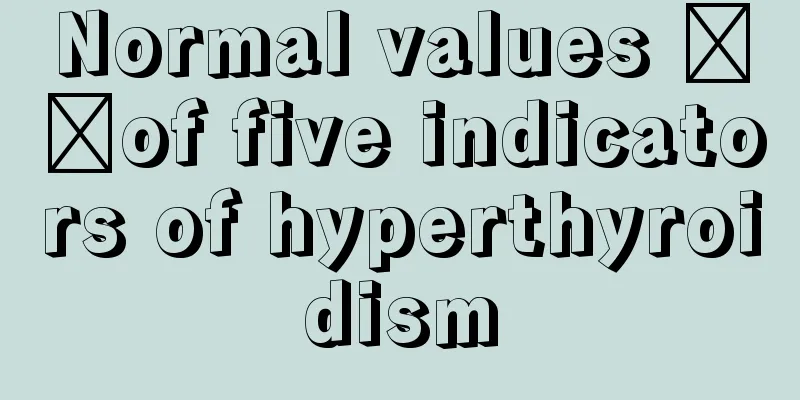What is the normal level of glycosylated hemoglobin?

|
There is a standard value for glycosylated hemoglobin. If the glycosylated hemoglobin is too high or too low and not within the normal range, it means that there are indeed some disease conditions in the body. For normal conversation, the glycosylated hemoglobin value is 6.1 to 7.9. 1. The three standards for meeting blood sugar standards are fasting blood sugar, blood sugar 2 hours after a meal and glycosylated hemoglobin. Many diabetic patients only pay attention to fasting blood sugar and 2 hours after meal, but ignore the detection of glycosylated hemoglobin. In fact, if only fasting and postprandial blood sugar levels meet the standards but glycated hemoglobin is not well controlled, it proves that blood sugar control is still not up to standard. 2. Clinical research generally uses the normal value of glycosylated hemoglobin as the standard: 6.1-7.9. That is to say, as long as the normal value of the person examined is maintained within this range, the normal value standard can be determined. 3. Glycated hemoglobin is the product of the combination of hemoglobin and glucose in red blood cells. It can reflect the blood sugar level in the three months before blood collection. It is currently the most effective and reliable indicator to reflect the quality of blood sugar control. Diabetic patients should take glycated hemoglobin ≤ 7.0% as one of the treatment criteria. The standard can be slightly relaxed for the elderly (7.0%-7.5%). Young and middle-aged people should control glycated hemoglobin at ≤ 6.5% or lower. For every 1% decrease in glycated hemoglobin, diabetes-related complications can be reduced by 20%. 4. Only when fasting blood sugar is controlled between 3.9-6.1 mmol/L, 2-hour postprandial blood sugar is controlled between 7.0 mmol/L, and glycosylated hemoglobin is controlled below 6.5%, can the ideal control target be achieved. That is, not only the fasting hyperglycemia in the basal state but also the postprandial hyperglycemia in the load state should be controlled. Only when these two blood sugar levels are well controlled can glycosylated hemoglobin be reduced to the ideal level, thereby delaying and preventing the occurrence of various complications. 5. There are many methods for detecting glycosylated hemoglobin, the commonly used ones are microcolumn ion exchange chromatography, affinity chromatography, high pressure liquid chromatography, immune agglutination, ion capture method, electrophoresis, etc. The main manufacturers include SD10 and Primus from Bio-Rad in the United States, G7 from TOSOH in Japan, DREWSCIENTIFIC in the United Kingdom, DCA Vantage from SIEMENS in Germany, Nycocard Reader II from Nycocard in Norway, etc. |
<<: What causes suppuration in the nail?
>>: How to treat arteriosclerosis? Health porridge can help you resolve
Recommend
How to treat glioma in the early stage
There are more and more diseases nowadays, and gl...
What is the causative agent of meningococcal infection?
Most meningococci exist in neutrophils. These bac...
Where are the early symptoms of lung cancer manifested? The early symptoms of lung cancer are manifested in 4 aspects
In the health science knowledge of our people ove...
The dangers of mouth breathing
For those patients with rhinitis, they often feel...
Is pain in the ribs a sign of liver cancer? Don’t necessarily pay attention to these points
Costochondritis, also known as anterior chest wal...
What are safe painkillers?
Many people often need to take some painkillers, ...
The main cause of esophageal cancer
Among cancer diseases, esophageal cancer is very ...
What kind of exercise is good for lymphoma
With the rapid development of modern society in r...
What are the causative factors of prostate cancer
In current clinical experiments, there is no spec...
What are the effects of soap
When it comes to soap, I believe everyone is fami...
Drugs that nourish the liver, kidneys, and qi and blood
According to the theory of traditional Chinese me...
What are the factors that easily lead to cervical cancer? Can the treatment of cervical cancer be delayed?
According to statistics, more than 95% of women s...
The efficacy and function of goat milk soap
Everyone knows that goat milk contains cell growt...
What's going on when my eyelids twitch and the corners of my mouth twitch?
If your eyelids twitch and the corners of your mo...
How do the late symptoms of cardia cancer manifest?
Cardiac cancer is actually a type of gastric canc...









